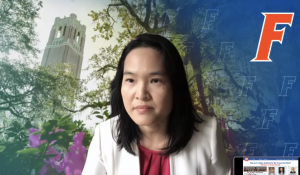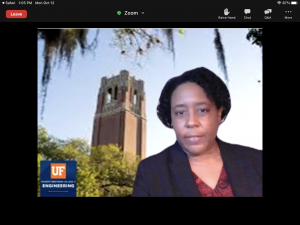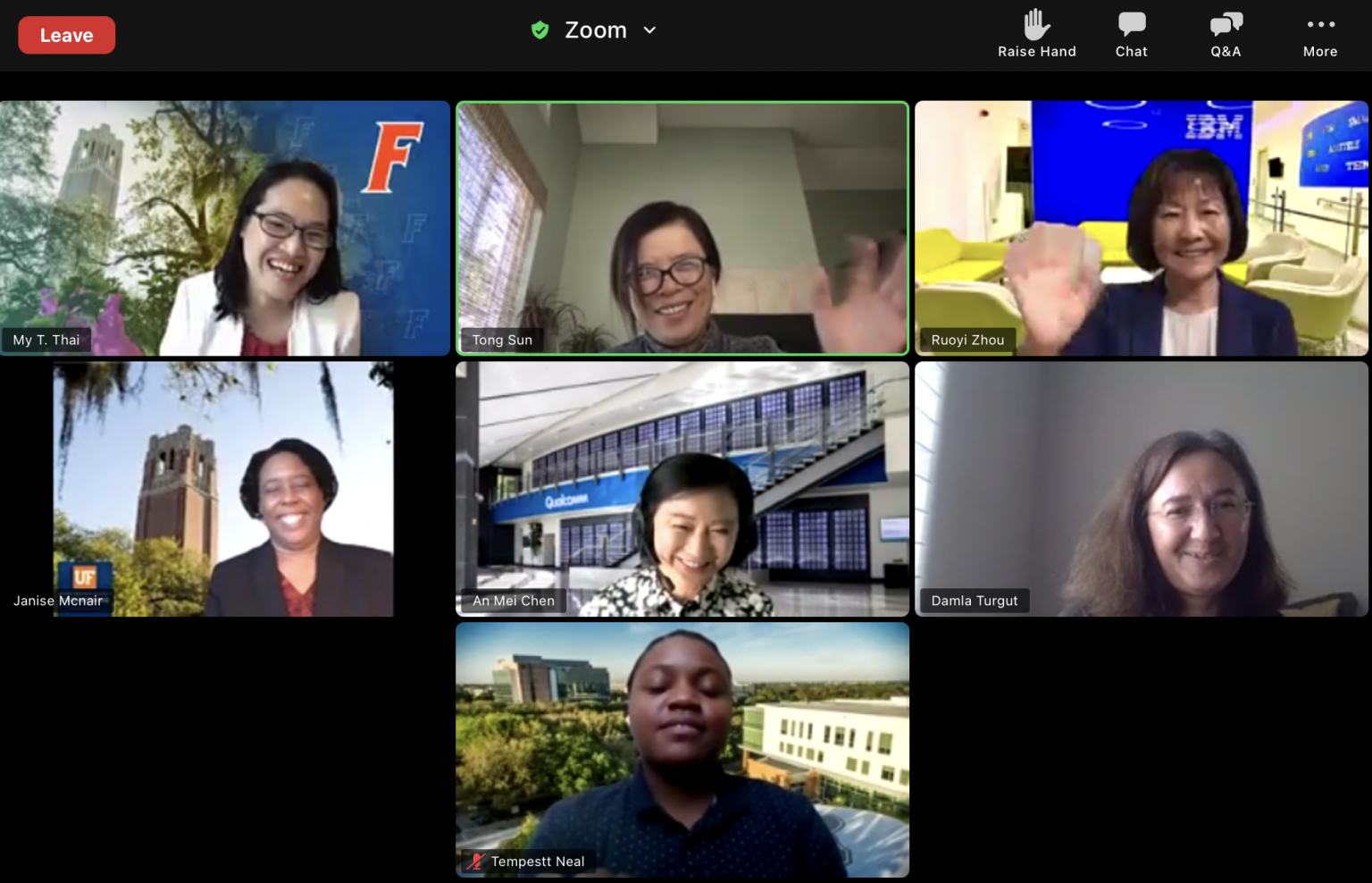Hosted by the Warren B. Nelms Institute for the Connected World, the first annual Women in IoT Workshop, “Leading through Change,” took place virtually on Monday, Oct. 12 via the Zoom videoconferencing platform. With a keynote speaker, panel discussions, and student poster sessions, the densely packed workshop was more like a mini-conference. More than 200 registrants were able to join from all over the world. Workshop co-chairs Dr. Janise McNair, Dr. My T. Thai and the organizing committee, Dr. Damla Turgut, Dr. Tempestt Neal and Dr. Liting Hu, worked tirelessly to:
…bring together women leaders from all sectors of IoT and students interested in the field of IoT to promote and enable the increased participation of women and to address the gender gap issue in the field.
After welcoming opening remarks from Dean Cammy Abernathy of the Herbert Wertheim College of Engineering, the keynote presentation was delivered by Wendi Heinzelman, Dean of the Hajim School of Engineering and Applied Science at the University of Rochester. In her talk, “Wireless Sensor Networks in the Age of Big Data,” Dr. Heinzelman spoke about the evolution of the foundational ideas surrounding the area of IoT, from wireless sensor networks, to artificial intelligence to machine learning concepts that date back to the 1950s. She emphasized the new frontiers in expansion, engineering integration with data science techniques, cross-discipline investigation, and engineering creativity. She finished her talk by inspiring the audience with stories from her personal journey to become a dean in engineering.

Two panel discussions followed: Academic and Government Agency Leadership and Industry Leadership. In both, participants discussed personal experiences on their respective journeys to positions of engineering leadership, namely the importance of mentorship as well as the importance of staying open to new opportunities. A recurring theme was that for many, a willingness to follow an unexpected, unfamiliar, (or seemingly tangential) path was critical to their outstanding career success.
Dr. Wendy Nilsen, lead Program Director in the NSF Smart and Connected Health program spoke about her journey that lead through business, health and technology to an influential role at the intersection of health and engineering. Dr. Ruoyi Zhou, Director, IBM Research, Ireland encouraged people to say yes to opportunities – even when they do not fit your pre-determined path, and especially when encouraged by a trustworthy mentor. It can result in a very rewarding, career-building experience. Many panelists, when sharing their personal journey, related well to an observation by Muriel Medard, Cecil H. Green Professor in the Electrical Engineering and Computer Science (EECS) Department at MIT. After explaining how her unconventional background and interesting career choices had enabled her to accomplish many exciting technological advances, she said she would never have imagined that her journey would lead to her fantastic career. “If you had told me 20 years ago that this is where I’d be, I’d have said that you’re crazy.” The willingness to go ‘off script’, i.e., being the person who is willing to try new things and take on new challenges, turned out to be key to their success.
Mentorship and representation made all the difference to many of the panelists. For Dr. Raquel Hill, Chair and Professor of Computer and Information Sciences at Spelman College, it made all the difference in her life as an undergraduate student to see someone who looked like her succeed in obtaining a PhD in engineering in her department. After witnessing the first African American Ph.D. graduate in computer science from her institution, she recalled, “You understand what can be done when you see it being done.” Others noted how critical mentoring relationships can be. Dr. Tong Sun, Lab Director, Adobe Research spoke about choosing mentors for their strengths in areas that are unfamiliar so that you can grow and improve your knowledge base. Dr. An Chen, Senior Director, Engineering, Qualcomm, emphasized the courage to reach out, whether by asking someone to be a mentor (people rarely say no), or by building up a team for a new start-up company. As Dr. Zhou noted, “the partnerships matter.”

Persistence was a common theme—Dr. Nava, interim dean of engineering at the University of El Paso, recalled that when she started as an undergraduate student years ago, a (male) professor told her that she would never graduate. She defiantly thought, “Watch me.” Not only did she succeed in the department, but she succeeded in winning over her doubters. The male professor who at first thought she would never graduate, later decided to nominate Dr. Nava for a scholarship for graduate school in engineering. Several panelists recounted how, after their capabilities were underestimated by those around them, it was great that they were able to prove their doubters wrong.
The panel discussions were followed by a virtual student poster session. Graduate and undergraduate teams with lead and/or partnering female student researchers were invited to submit an abstract. The authors of the accepted abstracts presented their research posters live in individual online poster sessions at the end of the workshop. The students also pre-recorded a five-minute presentation to post on the workshop’s youtube channel.
The full program is available on the Nelms Institute website, and a recording of the entire workshop is available here.
